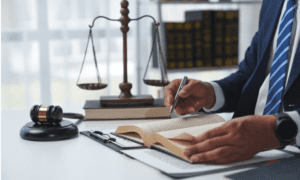Eyewitness testimony has long been considered one of the most powerful forms of evidence in criminal cases. However, despite its persuasive nature, eyewitness identification is unreliable and can lead to wrongful convictions. In Houston, Texas, numerous individuals have been exonerated after spending years behind bars due to eyewitness misidentification.
To protect the rights of the accused and prevent miscarriages of justice, it is crucial to understand the factors that contribute to eyewitness misidentification and the steps that can be taken to mitigate its impact. Those facing criminal charges based on eyewitness testimony should seek the assistance of experienced defense attorneys who can find top defense lawyers in Houston to challenge the identification’s reliability and protect their rights.
The Fallibility of Human Memory
One of the primary reasons eyewitness misidentification occurs is the fallibility of human memory. Despite the common belief that memory works like a video recorder, accurately capturing and storing events, research has shown that memory is malleable and can be influenced by various factors.
Eyewitnesses can be affected by stress, fear, and other emotions experienced during a crime, which can distort their perception and memory of the event. Additionally, the passage of time can lead to memory decay, causing witnesses to forget essential details or fill in gaps with information that may need to be more accurate. Understanding the limitations of human memory is crucial for evaluating the reliability of eyewitness testimony.
Biases and Stereotypes
Biases and stereotypes can also play a significant role in eyewitness misidentification. Studies have shown that witnesses are more likely to misidentify individuals who belong to a different racial or ethnic group than their own, a phenomenon known as cross-racial bias.
Moreover, witnesses may be influenced by unconscious biases or stereotypes based on age, gender, or appearance. For example, a witness may be more likely to identify a suspect who fits a preconceived notion of what a criminal looks like, even if that person is innocent. Recognizing and addressing the impact of biases and stereotypes is essential for ensuring fair and accurate eyewitness identifications.
Suggestive Police Procedures
Suggestive police procedures can compromise the reliability of eyewitness identifications. To address these issues and enhance the fairness of criminal justice processes, specific reforms have been implemented:
- Suggestive Identification Practices: Common practices that may lead to misidentification include showing a witness only a single suspect instead of a lineup or police officers giving verbal or nonverbal cues that could influence a witness to pick a particular individual.
- Reform Measures in Houston: To reduce the risk of these suggestive procedures, law enforcement agencies in Houston and across Texas have adopted evidence-based practices to minimize bias. These include double-blind lineups, where neither the witness nor the administrator knows the suspect’s identity, ensuring that no inadvertent cues are given, and sequential lineups, where witnesses view suspects one at a time instead of all at once.
- Purpose of Reforms: These changes aim to ensure that identification procedures are carried out impartially and justly, decreasing the likelihood of wrongful identification and subsequent wrongful convictions. Such practices are crucial for maintaining the integrity of the criminal justice system.
Lack of Corroborating Evidence
Eyewitness testimony is often seen as compelling evidence in criminal cases, but it is essential to recognize that it should not be relied upon in isolation. The lack of corroborating evidence, such as physical evidence or other witness accounts, can increase the risk of wrongful conviction based on eyewitness misidentification.
In cases where eyewitness testimony is the primary or sole evidence against a defendant, it is crucial for defense attorneys to thoroughly investigate the circumstances surrounding the identification and challenge its reliability. This may involve presenting expert testimony on the factors that can affect eyewitness memory or highlighting inconsistencies in the witness’s account.
The Role of Expert Testimony
Expert testimony can play a vital role in educating jurors about the factors that contribute to eyewitness misidentification and the limitations of human memory. Psychologists and other experts in the field of eyewitness identification can provide valuable insight into the scientific research on memory and perception and help jurors understand the potential for error in eyewitness accounts.
In Houston, defense attorneys can find top defense lawyers in Houston area who have experience working with eyewitness identification experts and presenting their testimony in court. By providing jurors with a more comprehensive understanding of the issues surrounding eyewitness identification, expert testimony can help prevent wrongful convictions based on misidentification.
The Importance of Timely and Thorough Investigation
Prompt and thorough investigation is crucial in cases involving eyewitness identification. The longer the delay between the crime and the identification procedure, the greater the risk of memory decay and contamination. Law enforcement agencies in Houston should prioritize conducting identification procedures as soon as possible after a crime has been reported.
Additionally, defense attorneys must conduct their own investigation into the circumstances surrounding the identification, including reviewing any available video footage, interviewing witnesses, and examining police reports. By thoroughly investigating the case and uncovering any inconsistencies or issues with the identification, defense attorneys can build a strong case for challenging the reliability of the eyewitness testimony.
The Need for Systemic Reform
While individual cases of eyewitness misidentification can be addressed through effective defense strategies, preventing wrongful convictions on a larger scale requires systemic reform. In recent years, there has been growing recognition of the need for evidence-based practices and policies to improve the accuracy of eyewitness identifications.
Some potential reforms include requiring the use of double-blind and sequential lineups, videotaping identification procedures, and providing witnesses with clear instructions that the perpetrator may or may not be present in the lineup. Additionally, increasing funding for research on eyewitness identification and providing training for law enforcement and legal professionals can help promote a more informed and critical approach to evaluating eyewitness testimony.
The Importance of Legal Guidance in Light of New Penalties
As Houston’s criminal law evolves, particularly with the introduction of stricter penalties for certain offenses, the need for skilled legal representation becomes increasingly critical. Defendants must be proactive in seeking out knowledgeable attorneys who can provide a robust defense and navigate the complexities of new legal landscapes. Understanding these changes and preparing adequately with the help of a qualified legal team is essential for anyone facing the possibility of enhanced penalties under the new laws.



































